I’m running late for my next appointment, and as I rush out of the Grand Khan Irish pub, I look across the sea of cars around Sukhbaatar square, and I cover my mouth with my scarf to try and filter the Coal and Carbon Monoxide filled air. The guide books say UlaanBaatar in winter has some of the worst air quality of any capital city in the world, yet somehow I’ve decided breathing through a scarf will make it all alright.
I know that Susan has been waiting for me for at least 20 minutes in front of the Pink Opera house, and in order to make it there, I’ve still got to negotiate at least two of the the very bizarre intersections that this city has to offer. Since many cars don’t find stop lights compelling enough to obey, I take a certain degree of comfort when I see that not only does this intersection feature traffic police trying to look tough in their sunglasses, but young Mongolians with fluorescent safety vests and mini stop signs. After a long delay, they swing out their arms and start waving the stop signs, in a few cases scolding cars that seem to almost run them down. I blow past the people walking at a normal speed, the tall westerner covered from head to toe in winter gear, using a scarf to cover most of his face and sunglasses to hide his eyes. 25 minutes- I zoom past the very small amount of people at Sukhbaatar Square, tourists perhaps, more people who like me, don’t mind showing up at the tail end of winter.
In front of the Pink Opera house, I find the blue SUV, and there inside is Susan, who to this point I have only spoken on the phone with once. After launching into several apologies, Susan immediately puts me at ease: “No problem. Actually, its nice when people are late, gives me a chance to have a little down time.” — Happy to have some downtime; I love Mongolia.
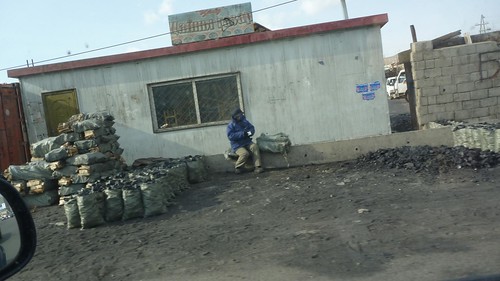
Susan is Project Manager for Flourishing Future*, a non governmental organization working in the Ger (The Mongolian tent many people call Yurts) District. On her business card is the phrase “Helping the Poorest of the Poor” in plain black letter type. Greetings and hello’s being concluded, off we ride through the city center and out to the western side of the city. We drive and talk, my eyes soaking in the rapidly changing cityscape, my mind soaking in the details of what is clearly a very interesting and knowledgeable person. As she explains her relationship to Mongolia, which is more than a decade old, my eyes scan each roadside shack selling bags and bags of coal, wood, car parts, and what I think was scrap metal. Every now and again we pass a line of donkey-pulled carts, waiting to haul heavy loads of wood which I don’t think you’re allowed to carry onto the bus. Susan seems to read the fact that I’m quite taken by what looks like such a different city to when we started, our conversation shifts to what is going on outside and the drunk man that has passed out just as he was crossing the street. Cars drive around him.
A slow left turn and we’re on a dirt road, or at least it seems to be a dirt road, with plenty of craters in it. Susan steers the car towards the side of the road as if we’re pulling over, she explains that we’re not pulling over, but in fact driving on the side of the road or off the road is sometimes smoother than staying on it. As we do this the occasional person walks by us in the opposite direction, unhindered by the potholes. This pseudo road is lined with fences that lead further and further up the mountain, and behind these fences I can see a few very small brick houses and a whole lot of the traditional Gers (or Yurts). It’s the first time I’m this close to this internationally known symbol of nomadic life in Mongolia, and just then it dawns on me-we’ve arrived in the Ger District.
*Link to Rinky Dink Travel, which is associated with Flourishing Future and also took the time to take me around the district.
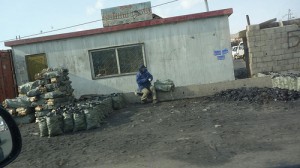
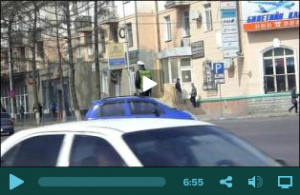
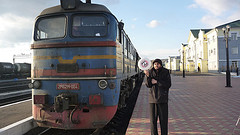
 A short podcast from the Russia-Mongolia border. As it takes about 3 hours to clear Russian customs, and more than 1 hour to clear Mongolian customs, I decided to get out and record some observations and thoughts especially in regards to the first two weeks in Siberia. You’ll also hear me briefly interrupted by the arrival of a battalion of Russian border guards.
A short podcast from the Russia-Mongolia border. As it takes about 3 hours to clear Russian customs, and more than 1 hour to clear Mongolian customs, I decided to get out and record some observations and thoughts especially in regards to the first two weeks in Siberia. You’ll also hear me briefly interrupted by the arrival of a battalion of Russian border guards.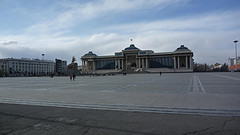
 “I can offer you a job, you should stay longer; for many foreigners Mongolia is very interesting right now.”
“I can offer you a job, you should stay longer; for many foreigners Mongolia is very interesting right now.”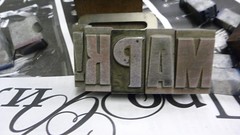 I set off from Tomsk in the direction of Kemerovo more than 2 weeks ago, yet memories of the adventures and encounters that I had there still dance in my head. In sorting through all the video I recorded during that time, I’ve put together one more video montage of my experience as a guest lecturer and overall visitor in Tomsk, a city which I found to be very interesting; where everyday I learned something new.
I set off from Tomsk in the direction of Kemerovo more than 2 weeks ago, yet memories of the adventures and encounters that I had there still dance in my head. In sorting through all the video I recorded during that time, I’ve put together one more video montage of my experience as a guest lecturer and overall visitor in Tomsk, a city which I found to be very interesting; where everyday I learned something new.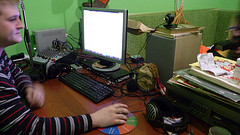
 When you wander around the streets of Tomsk in Siberia, you may think the place looks a little behind the times. But beneath the surface there are in fact new and creative ideas in the world of new media taking root. In this particular podcast we hear from a videoblogging priest about why he uses the internet as a tool in his community, and how some young DJ’s have turned to internet radio as their main stage for playing music. (special bonus at the end, me ringing the church bells, I apologize in advance to your ears.)
When you wander around the streets of Tomsk in Siberia, you may think the place looks a little behind the times. But beneath the surface there are in fact new and creative ideas in the world of new media taking root. In this particular podcast we hear from a videoblogging priest about why he uses the internet as a tool in his community, and how some young DJ’s have turned to internet radio as their main stage for playing music. (special bonus at the end, me ringing the church bells, I apologize in advance to your ears.)